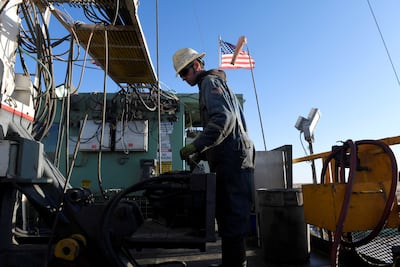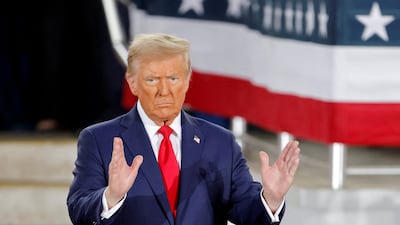Donald Trump’s election victory may result in the enforcement of tighter sanctions on oil-producing countries such as Iran and Venezuela, which in turn could limit the global supply of crude and boost prices in the longer term, analysts have said.
The Republican candidate declared victory in the White House race early on Wednesday after securing key swing states. Global stocks surged as investors widely expect Mr Trump to cut taxes and ease regulations, helping some industries.
Oil prices dropped nearly 2 per cent on Wednesday, which analysts linked to a stronger dollar, expectations of rising US supply and a potential slowing demand due to tariff tension with key trading partners, especially China.
“In our view, the market is too focused on the impact of potential tariffs, and their impact on economic growth and oil demand growth. But Trump could also opt again to tighten sanctions on oil producers like Iran and Venezuela,” said Giovanni Staunovo, strategist at UBS.
Since President Joe Biden assumed office in January 2021, the enforcement of sanctions has relaxed, leading China to become a significant buyer of Iranian oil, often at discounted prices.
Iran was the second-largest source of crude supply growth last year after the US, with production reaching about 3.4 million barrels per day and exports at about 1.5 million bpd.
A Trump-led administration is expected to enforce punitive measures on Iran more aggressively. In 2018, during his previous presidency, Mr Trump pulled the US out of the Joint Comprehensive Plan of Action, under which Iran had agreed to limit its nuclear programme in exchange for the lifting of economic sanctions.
However, some experts say he may take a different approach in his second term. “Longer-term, there is a likelihood of tighter oil sanctions against Iran and Venezuela but that is not looming on the market, especially as Trump did not make any threats on those fronts during his campaigning,” said Vandana Hari, founder and chief executive of Vanda Insights.
“He may take a different approach in his second innings, especially to Iran, as the threat of sanctions could also be used as a bargaining chip in negotiations over Gaza, in addition to the nuclear programme."
Oil markets have been on edge over the past few months as Iran, the main backer of Hezbollah and Hamas, engaged in a series of retaliatory attacks with Israel amid the Gaza war, raising concerns about vital energy infrastructure being the target for attack.
The market is also starting to "price in" a resolution to the Gaza crisis and the Ukraine war, which is bearish for geopolitical risk to oil supply, Ms Hari said.
Shale push
Mr Trump has vowed to ease certain climate regulations and support US shale production. However, analysts and industry insiders do not foresee a substantial rise in output.
“Trump is pro-US oil and gas production but I don’t anticipate he will be able to give a major fillip to the sector,” Ms Hari said. “US shale drillers can be expected to continue making production decisions based on market economics and shareholder expectations."
US oil and gas production will reach another record this year but the rate of increase is expected to slow as companies adjust to industry mergers. Last year, the country’s oil production peaked at an unprecedented 12.9 million barrels daily.

“It was under the previous Trump administration that you saw the largest growth in renewables and under the current Biden administration you had a great surge in oil and gas, so I think at the end of the day economics plays a critical role as well,” Shell’s chief executive Wael Sawan said at Adipec this week.
Opec+ policy
Mr Trump’s election win is unlikely to change the policy of producers' group Opec+ as US shale production has been slowing over the past few years.
A shale boom, centred on the Permian Basin region in Texas and New Mexico, transformed the US into a net exporter of crude in 2018, for the first time in 75 years. The influx of US crude pressured oil prices, eroded Opec+'s market share and forced the group into production cuts to stabilise the market.
“Opec+ is not overly concerned about non-Opec growth, as US shale production has slowed and growth is now lower than historical levels,” said Mukesh Sahdev, global head of commodity markets and oil at Rystad Energy.
“Additionally, the quality of US shale oil is becoming lighter, which presents challenges for refineries in both the US and Europe, particularly as the petrochemical market faces weaker demand."
Given Opec+'s "cautious" approach to increasing oil production and continued economic stimulus measures in China and the US, UBS maintains a "moderately constructive" outlook for oil prices, Mr Staunovo said.
The oil market is headed towards a "sizeable surplus" next year on higher supply from non-Opec+ countries and weakening demand from China, the International Energy Agency said.
Inflation Reduction Act
Earlier in his presidential campaign, Mr Trump pledged to revoke any unused funds under the Inflation Reduction Act (IRA). The IRA, a landmark climate law passed by the Biden administration in 2022, pledged billions of dollars in new spending and tax breaks to boost clean energy and electric vehicle ownership.
“Trump would likely be unable to repeal the IRA without congressional support … [but could] make tax credits hard to access,” said Jason Bordoff, founding director at the Centre on Global Energy Policy at Columbia University.
“Moreover, the job growth and investment resulting from the IRA in domestic manufacturing of clean energy technologies like solar and electric vehicle batteries has been overwhelmingly beneficial to Republican-leaning states,” he said last month in a report.

